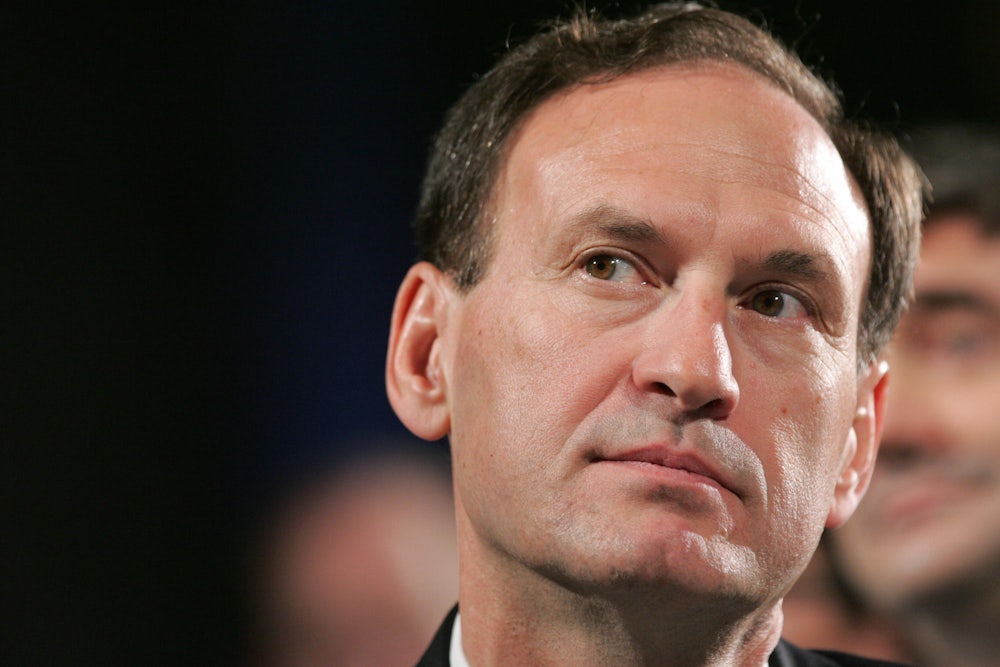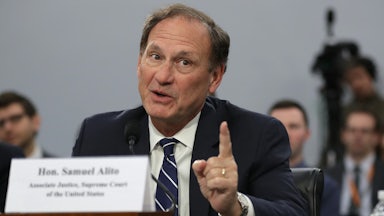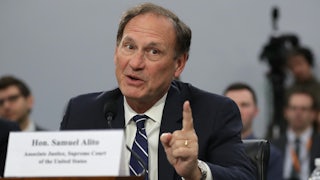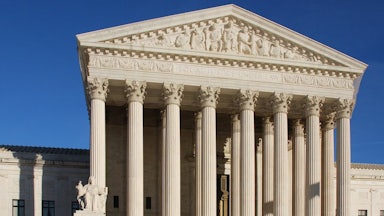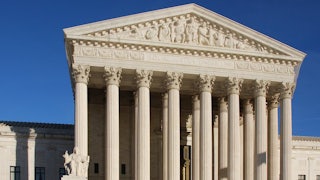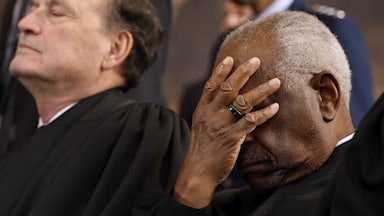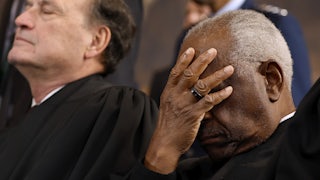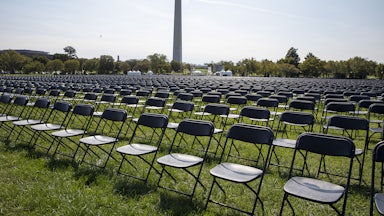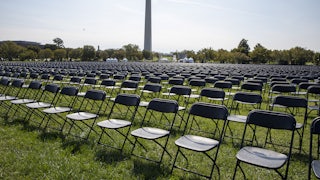If the Supreme Court overturns Roe v. Wade in the next two months, as a recent leak of a draft decision indicated that it would, it will mark a major turning point in how Americans understand their constitutional rights. The Supreme Court has expanded those rights at times and narrowed them at others. It has recognized certain constitutional rights while denying that others exist. But the court has never before said that a constitutional right existed and then reversed itself to deny it, until Justice Samuel Alito came along.
In his draft opinion in Dobbs v. Jackson Women’s Health Organization, Alito justifies his decision by drawing heavily upon Anglo-American legal history dating back to the Middle Ages. “The eminent common-law authorities (Blackstone, Coke, Hale, and the like) all describe abortion after quickening as criminal,” he explained, referring to the archaic term for when a fetus begins to move in its mother’s womb. “Writing near the time of the adoption of our Constitution, Blackstone explained that abortion of a ‘quick’ child was ‘by the ancient law homicide or manslaughter’ (citing Bracton), and at least ‘a very heinous misdemeanor’ (citing Coke),” Alito added.
I would not go so far as to say that Blackstone and other early English legal thinkers should be ignored entirely when contemplating the mysteries of American constitutional law. But reliance on them when it comes to the scope of women’s rights would be an error. And while it’s one thing to use these treatises to establish a floor for rights in Anglo-American legal tradition, it’s quite another to use them as the ceiling.
The United States inherited its legal tradition from English common law after independence. And while Americans have introduced many innovations to it over the last two and a half centuries, judges—especially originalist judges like Alito—often rely upon much older sources when discerning the scope of our constitutional rights. Sometimes this history can cut in Americans’ favor. Two years ago, in Ramos v. Louisiana, for example, the court cited Blackstone’s writings on jury trials when it ruled that the Sixth Amendment requires all criminal convictions to be handed down by unanimous juries, something that the text does not explicitly say but which can be inferred from its historical context.
One major hurdle for this approach to constitutional law—and for originalism in particular—is that not everyone had the same rights and privileges in 1789, when the Constitution was drafted, or even in 1868 when the Fourteenth Amendment’s ratification applied the Bill of Rights to the states. Originalist legal scholars (and their critics) have often grappled with whether Brown v. Board of Education can be squared with the original understanding of the Fourteenth Amendment, which was ratified in an era when school segregation existed. That quandary is even greater for originalists when it comes to Loving v. Virginia, the 1967 ruling that abolished state laws banning interracial marriages. Not only did most lawmakers support miscegenation laws in the late nineteenth century, but interracial relationships were not accepted by a majority of Americans, in general, in opinion polls, until the 1990s.
The Anglo-American legal tradition wasn’t exactly welcoming to women’s rights, either. After Alito’s draft opinion leaked to the press, more than a few observers noted that one of his most cited sources, Matthew Hale, might not be a reliable source on the law’s treatment of women. Hale was one of seventeenth-century England’s most prominent jurists and one of the few to successfully navigate the English Civil War, Oliver Cromwell’s Protectorate, and the House of Stuart’s eventual restoration to the throne. He presided over multiple witchcraft trials where women were hanged; he also insisted that marital rape was not a crime. Most notoriously, he created the “Hale warning,” which told centuries of English and American juries that rape allegations made by women should not be readily believed.
William Blackstone, whose Commentaries served as a foundational text for American constitutional thought, was not quite as extreme as Hale but was also no feminist thinker. In the Commentaries, he still echoed the prevailing sentiment in English law at the time that women effectively forfeited most, if not all, of their rights to their husband when they married. “The very being of legal existence of the woman is suspended during the marriage, or at least is incorporated and consolidated into that of the husband,” he explained. This approach dominated early American law for more than a century, with some of the last barriers it imposed not falling until the 1960s and 1970s.
What did English women legal scholars from the time period described by Alito think about abortion specifically or about reproductive rights in general? A quick survey of the era turns up nothing because—well, no English women legal scholars existed until the twentieth century. The first English woman to obtain a law degree did so in 1888; Parliament did not allow women to practice law in Britain until 1919. The complexity of British courts and judicial offices makes it hard to pin down exactly who was the country’s first woman judge, but the most likely candidate is Sybil Campbell, who became a stipendiary magistrate at Tower Bridge Magistrate’s Court in 1945.
The U.S. milestones for women in the legal profession are slightly better, but only just. American women did not serve on state juries until 1870, practice law until the latter half of the nineteenth century, or serve on state courts until that century’s end. Genevieve Cline, the first woman to serve as a federal judge in any capacity, was appointed in 1928. It also goes without saying that no women were present when the Founders drafted the Constitution. When Congress and the state legislatures ratified the Fourteenth Amendment in 1868, it would still be another 28 years before a woman first served as a state lawmaker.
Conservative legal scholars often thunder against judges who reference or incorporate foreign law in American legal decisions, especially when it comes to interpreting the Constitution. (Pre-1776 English common law is not considered “foreign” by them in this context.) For untold generations of American and English women, the law was always a foreign country. They had no role in its creation, no say in its development, no ability to influence its outcomes, and few protections under its rule. To negate a woman’s right to reproductive self-government because it cannot be found in English common law is like arguing that fish aren’t real because they cannot be found in your bathtub.
One reason why Alito’s draft opinion is so alarming is what it forebodes for other constitutional rights that he and some of his colleagues may find distasteful. The same English legal luminaries that he cited to argue against abortion rights are uniformly hostile to same-sex relationships, with Coke describing them as “against the ordinance of the Creator and the order of nature” and Blackstone referring to them as “a crime not fit to be named.” I would like to think that at least a majority of justices agree that there is a constitutional right to marriage in general and that same-sex couples cannot be excluded from that right under the Fourteenth Amendment. But if a majority of justices think rights can be lost because archaic English legal treatises say so, then marriage equality is no longer as surefooted as it once was.
And for the court’s Catholic justices, it makes even less sense to deny rights based on what pre-revolutionary English legal scholars once thought. For about a century and a half prior to American independence, the English legal system imposed a wide range of civil and religious restrictions on English Catholics who had refused to convert to the Anglican faith. Catholics were barred at various times from voting, teaching, owning or carrying firearms, inheriting land owned by non-Catholics, and holding public office. The last statutory restrictions on Catholics, including the ability to serve in the judiciary, were not repealed until the British government swept them away in 1829—not out of the goodness of its own heart but to stave off an imminent uprising in Ireland.
Before then, anti-Catholic measures enjoyed a healthy amount of support from the English legal establishment. Coke, in his Institutes, discussed the crime of praemunire, which generally meant supporting any foreign jurisdiction over England but often specifically referred to those who supported papal authority. Coke noted favorably that “from the conviction, the defendant shall be out of the king’s protection, and his lands and tenements, goods and chattels, forfeited to the king: and that his body shall remain in prison at the king’s pleasure.” Roughly a century later, Blackstone concluded that it was no longer legally defensible to kill a man guilty of praemunire on sight, as Coke had once thought. But he added that the defendant still generally lost the protection of the English legal system, “being so far out of the protection of the law, that it will not guard his civil rights, nor remedy any which he as an individual may suffer.”
Fortunately, Alito and the other four Catholic justices need not worry about a reversal of Catholic emancipation in the United States. One of the most important things that early Americans shed after independence was the overt religious sectarianism that had consumed Europe for centuries. The Constitution explicitly forbids religious tests for public office, and the First Amendment directly prohibits the creation of an established church. And even if they didn’t, it would be unthinkable to rely on centuries-old texts on English law to deprive American Catholics of their equal role in modern society. It should be equally unthinkable to use them to revoke any constitutional right held by Americans in this century.
